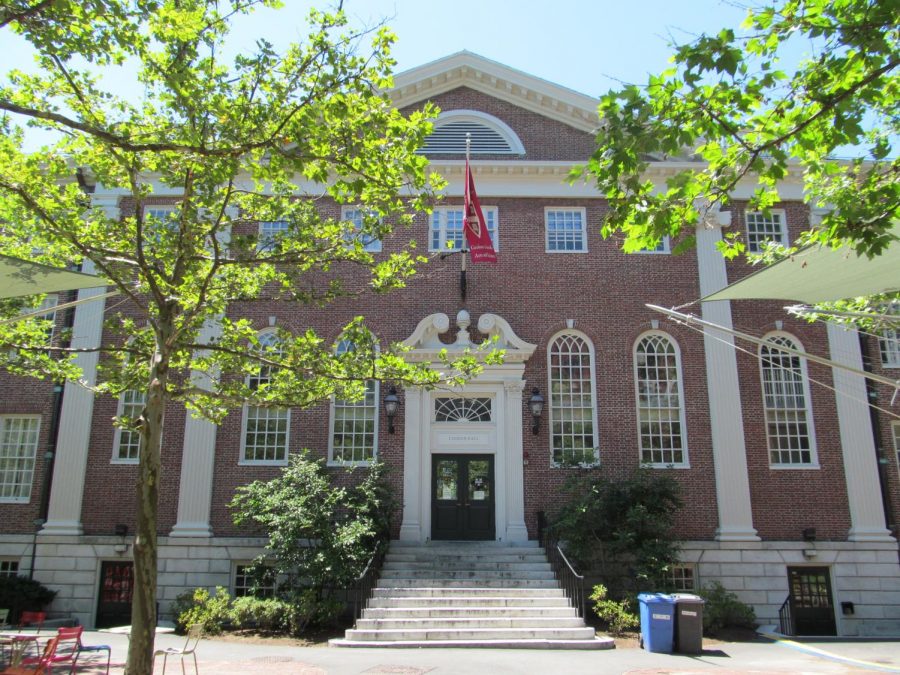Harvard’s Racial Dilemma
Harvard’s Dudley House Photo via Wikimedia Commons under Creative Commons License
It appears that Harvard’s use of race in admission decisions is gradually being revealed. In 2014, Students for Fair Admissions (SFFA) filed a lawsuit against Harvard University, accusing them of using a vague “personal rating” to reject Asian-American applicants in favor of students from other racial backgrounds.
According to an article by Nell Gluckman in “The Chronicle of Higher Education,” for at least 18 years, through 2013, Harvard’s admission rate for Asian-American students was less than that of white applicants and most other minorities, yet they bring stronger academic records than any other race. This information was revealed in charts created by Harvard’s Office of Institutional Research. Gluckman’s article goes on to say that “the 2013 charts were meant to analyze ‘tips’ applicants could receive for increasing their chances of admission.” One of these tips is the aforementioned personal rating.
During an ongoing trial at Boston’s federal courthouse, SFFA alleged that the university’s rating system and its inclusion of a personal score, which measures every aspect of the applicant’s personality, disadvantages Asian-American applicants. According to lawyers for the U.S. Department of Justice, the personal rating is vague and elusory, reflecting racial stereotypes that Asian-American applicants are less “likable.”
In addition, SFFA presented a document that is supposedly Harvard’s only guidance when deciding an applicant’s personal rating. It was simply a numerical rating from one, for “outstanding”, to five, for “questionable personal traits.”
The government has stated in the filing that Harvard has acknowledged it tends to score Asian-American applicants lower on the personal rating but could not explain why, showing an “intentional and unexplained use of race” in the admissions process.
The lawsuit also argues that Harvard practices “racial balancing,” saying the school works to maintain a certain distribution of each race on campus. This was ruled unconstitutional in past cases. “You have let the wolf of racial bias in through the front door,” says Adam Mortara, a lawyer for the SFFA.
Marlyn E. McGrath, director of Harvard’s admissions, was questioned by Mortara about the consideration of race and religion in admissions. McGrath explained that when applicants check a box on the Common Application indicating their religion, the information is unseen by Harvard’s admission officials. She believes that this lack of information is not an obstacle in evaluating an applicant, but she also thinks it would be a disadvantage if they could not consider their race.
Harvard, however, denied any racial discrimination, saying race is merely one factor that is considered and can only help a student’s chances in getting admitted. “Race alone is never the reason a student is granted admission. And race is never the reason a student is denied,” says William Lee, a lawyer for the college. Harvard believes the lawsuit threatens the flexibility that was previously granted to schools to build the type of student population that is best for their campus.
This case is likely to be appealed and may even end up before the U.S. Supreme Court, indicating the significance of the issue. Furthermore, the case follows a series of previous lawsuits challenging whether colleges can consider the race of applicants. Students for Fair Admissions believes the case could fix a system that places unfair weight on race, particularly at the expense of Asian-Americans, who are academically talented.
The case is expected to run through the end of October. Considering that Harvard is one of the world’s most renowned universities, this case may change the way students are admitted into college and create a more diverse and united student population on campuses.

James Mulkern is a member of the Class of 2021, and this is his third year on the Green Wave Gazette. He joined the newspaper team in his sophomore year...


